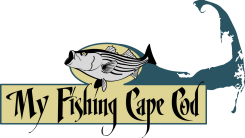Imagine for a moment that you've transported back to the American Industrial Revolution of the early 1800's. Factories are dumping millions of gallons of raw, untreated sewage into rivers and streams, and dams are being installed that completely prohibit the migration of fish.
All the while, Mother Nature seems to supply an endless chain of resources. During this time, rumors have it that anglers could catch 100+ wild sea-run trout in a single day, with 2.5 and 3 pounders mixed in. And every single one of those trout that was caught would be destined for the table.
According to Warren Winders of the Sea-Run Brook Trout Coalition, sea run brook trout were once so abundant that you could actually watch the trout feed on the surface in schools like stripers.

A wild, native Cape Cod Sea Run Brook Trout, which prior to the Industrial Revolution, were abundant and plentiful in Cape Cod's rivers, streams and bays.
Fast forward 200 years and for the most part, these fish that once called the rivers of Cape Cod their home, are now gone. Many streams that were abundant with salters are too overgrown, too hot, and too polluted to sustain a population.
Only a trace number of individuals are left in a select few streams. But even with that dying hope, these salters are as gorgeous as ever, and that doesn’t stop some devoted individuals from trying to save them, and restore their habitat.

The Industrial Revolution was a time of rapid development in the US., and contributed to the destruction of sea run brook trout habitat.
Working To Restore Sea Run Brook Trout Populations
Dating back to the mid-1970s, Cape Cod Trout Unlimited, or CCTU, was founded and headed by Fran Smith after returning from the Vietnam War in 1975.

Fran played a pivotal role in obtaining the Lyman property (pictured above, and now called the Lyman Reserve) surrounding one of the last remaining salter streams.
Through thousands of hours of labor and millions of dollars spent towards restoration, not only did Fran and CCTU help to restore that particular stream, but they built a model that could be applied to restoring other cold water streams.

In 2003, Fran Smith (pictured above) was awarded NOAA’s Environmental Hero award for his "tireless efforts to preserve and protect our nation's environment."
In 2009, the Sea Run Brook Trout Coalition was founded to extend the restoration efforts ongoing by Fran and CCTU.
The Sea-Run Brook Trout Coalition (SRBTC) is another non-profit organization with the sole purpose of protecting and restoring sea-run brook trout populations and their habitat on Cape Cod and greater New England.
The SRBTC assembles volunteers and donations to oversee and support multi-million dollar restoration efforts on this front. From installing habitat, to tagging individual fish, to relocating brook trout populations, the SRBTC has made incredible contributions to restoring and even revitalizing multiple salter streams.

An example of woody and rocky structures to be placed in a salter stream for habitat.
Cape Cod Sea-Run Brook Trout Tagging Efforts
Under the direction of Mass Wildlife's Steve Hurley, CCTU and SRBTC both tag sea run brook trout. Volunteers can take part in "electrofishing trips" where they tag these brookies with mini electronic chips (the same chips used by E-ZPass for toll collecting).
After being tagged, the trout can be tracked when they move past a specific station, or when they are caught by fisherman who can ID them with an electronic chip reader.

Geoff Klane of Brackish Flies carries around a chip reader like the one pictured above when targeting sea-run trout to be able to ID them when landed.
One of the tagged brookies actually made it all the way to the Chesapeake Bay. Unfortunately for that trout, it was in the stomach of a striped bass!
Data collected can provide valuable insight to how a population of trout is doing numbers-wise, as well as how they grow, and where they travel-especially when being relocated.
You can learn more about what the tagging process looks like here.
Fishing For Cape Cod's Sea-Run Brook Trout
Fast forward to December 4th, 2021, and here I am standing on the bank of what seems to be just another nice little creek, with some meanders and fallen trees.
If I drove by this particular stream, I might say to myself “Hmm...I wonder what I could catch in there?” But even then, this creek is so small that I might not think much of it.
On this day I met up with fishing guide, custom rod builder, and fly tyer Geoff Klane of Brackish Flies, Executive Director of the SRBTC Geoffrey Day, and Senior Advisor of the SRBTC Warren Winders.

Geoff Klane, Geoffrey Day, Warren Winders, and me. (Left to right).
It was really nice of these guys to come meet me and give me not only a tour, but a thorough history class on four different salter streams located on Cape Cod.
We even got to take a few casts!

